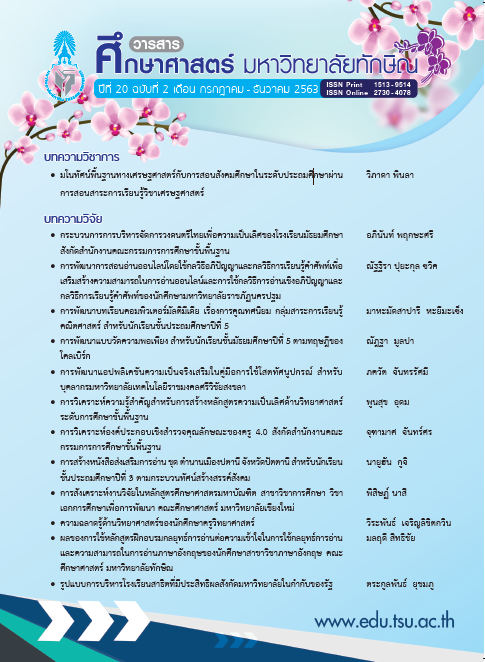การวิเคราะห์องค์ประกอบเชิงสำรวจคุณลักษณะของครู 4.0 สังกัดสำนักงานคณะกรรมการการศึกษาขั้นพื้นฐาน
Main Article Content
บทคัดย่อ
การวิจัยนี้มีวัตถุประสงค์เพื่อวิเคราะห์องค์ประกอบเชิงสำรวจคุณลักษณะของครู 4.0 สังกัดสำนักงานคณะกรรมการการศึกษาขั้นพื้นฐาน กลุ่มตัวอย่างที่ใช้ในการวิจัย คือ ครูผู้สอนสังกัดสำนักงานคณะกรรมการการศึกษาขั้นพื้นฐาน ปีการศึกษา 2562 จำนวน 597 คน โดยการสุ่มหลายขั้นตอน (Multistage Random Sampling) เครื่องมือที่ใช้ คือ แบบสอบถามแบบมาตราส่วนประมาณ (Rating Scale) จำนวน 131 ข้อ ค่าดัชนีความสอดคล้องระหว่างข้อคำถามกับจุดหมายของการวัด (IOC) เท่ากับ 0.8 ถึง 1.0 และมีค่าความเชื่อมั่นทั้งฉบับ เท่ากับ 0.991 สถิติที่ใช้ในการวิเคราะห์ข้อมูลคือ การวิเคราะห์องค์ประกอบเชิงสำรวจ (Exploratory Factor Analysis : EFA) สกัดองค์ประกอบโดยวิธีสกัดองค์ประกอบหลัก (Principal Component) และใช้การหมุนแกนแบบ varimax
ผลการวิจัยพบว่า องค์ประกอบคุณลักษณะของครู 4.0 สังกัดสำนักงานคณะกรรมการการศึกษาขั้นพื้นฐาน มี 5 องค์ประกอบ ได้แก่ 1) ด้านบุคลิกภาพของครูที่ส่งเสริมทักษะการคิดและนวัตกรรม 2) ด้านความรู้ที่ส่งเสริมทักษะการคิดและนวัตกรรม 3) ด้านการจัดกิจกรรมที่ส่งเสริมทักษะการคิดและนวัตกรรม 4) ด้านทักษะการวัดและประเมินผลผู้เรียนศตวรรษที่ 21 และ 5) ด้านทักษะการผลิตและพัฒนาสื่อเทคโนโลยี โดยมีค่าน้ำหนักองค์ประกอบมาตรฐานอยู่ระหว่าง 0.55 – 0.87 อย่างมีนัยสำคัญทางสถิติที่ระดับ .01 ทุกองค์ประกอบสามารถร่วมกันอธิบายความแปรปรวนของคุณลักษณะของครู 4.0 ได้ 73.469%
Article Details
ในกรณีที่กองบรรณาธิการ หรือผู้เชี่ยวชาญ ซึ่งได้รับเชิญให้เป็นผู้ตรวจบทความวิจัย หรือ บทความทางวิชาการมีความเห็นว่าควรแก้ไขความบกพร่อง ทางกองบรรณาธิการจะส่งต้นฉบับให้ ผู้เขียนพิจารณาจัดการแก้ไขให้เหมาะสมก่อนที่จะลงพิมพ์ ทั้งนี้ กองบรรณาธิการจะยึดถือความคิด เห็นของผู้เชี่ยวชาญเป็นเกณฑ์
เอกสารอ้างอิง
กระทรวงศึกษาธิการ. (2560). แผนการศึกษาแห่งชาติ พ.ศ. 2560 – 2579. กรุงเทพฯ: พริกหวานกราฟฟิค.
กระทรวงศึกษาธิการ. (2552). หลักสูตรแกนกลางการศึกษาขั้นพื้นฐาน 2551. กรุงเทพมหานครฯ: โรงพิมพ์ชุมนุมสหกรณ์การเกษตรแห่งประเทศไทย.
ดาวน์พงษ์ รัตนสุวรรณ. (2559). การบรรยายพิเศษ เรื่อง “ประเทศไทยกับการก้าวไกลทางการศึกษา”. การประชุมวิชาการเครือข่ายสถาบันอุดมศึกษาเขตภาคกลางเพื่อการพัฒนาบัณฑิตอุดมศึกษา ประจำปี 2559. สืบค้นจาก http:// www.kroobannok.com/79814.
ทวีศักดิ์ จินดานุรักษ์. (2560). ครูและนักเรียนในยุคการศึกษาไทย 4.0. วารสารมหาวิทยาลัยสุโขทัยธรรมาธิราช, 7 (2), 14-29.
นงลักษณ์ วิรัชชัย. (2542). โมเดลลิสเรล: สถิติการวิเคราะห์สำหรับการวิจัย (พิมพ์ครั้งที่ 3). กรุงเทพมหานคร: จุฬาลงกรณ์มหาวิทยาลัย.
พาสนา จุลรัตน์. (2561). การจัดการเรียนรู้สำหรับผู้เรียนในยุคThailand 4.0. วารสารมหาวิทยาลัยศิลปากร, 11(2), 2363-2380.
พิมพันธ์ เดชะคุปต์ และพเยาว์ ยินดีสุข. (2560). ทักษะ 7C ของครู 4.0. กรุงเทพมหานคร: โรงพิมพ์จุฬาลงกรณ์มหาวิทยาลัย.
ไพฑูรย์ สินลารัตน์และคณะ. (2559). การศึกษา 4.0 เป็นยิ่งกว่าการศึกษา (พิมพ์ครั้งที่ 3). กรุงเทพมหานคร: โรงพิมพ์จุฬาลงกรณ์มหาวิทยาลัย.
ไพฑูรย์ สินลารัตน์และคณะ. (2560). โรงเรียน 4.0: โรงเรียนผลิตภาพ (พิมพ์ครั้งที่ 2). กรุงเทพมหานคร: โรงพิมพ์จุฬาลงกรณ์มหาวิทยาลัย.
ไพฑูรย์ สินลารัตน์และคณะ. (2560). ก่อนถึงโรงเรียน 4.0: โรงเรียนสร้างสรรค์ (พิมพ์ครั้งที่ 2). กรุงเทพมหานคร: โรงพิมพ์จุฬาลงกรณ์มหาวิทยาลัย.
รัศมี เลิศอารมย์. (2549). ปัจจัยที่ส่งผลต่อสมรรถภาพครูวิทยาศาสตร์ของโรงเรียนในเครือมูลนิธิคณะเซนต์คาเบรียลแห่งประเทศไทย. (วิทยานิพนธ์ปริญญามหาบัณฑิต). จุฬาลงกรณ์มหาวิทยาลัย, กรุงเทพฯ
อภิภา ปรัชญพฤทธิ์. (2560). การพัฒนารูปแบบการผลิตครูเพื่อรองรับการศึกษายุค 4.0. วารสารร่มพฤกษ์ มหาวิทยาลัยเกริก, 35(3), 102-135.
Clark, Onristopher M. (1995). Thoughtful Teaching. London : Cassell.


